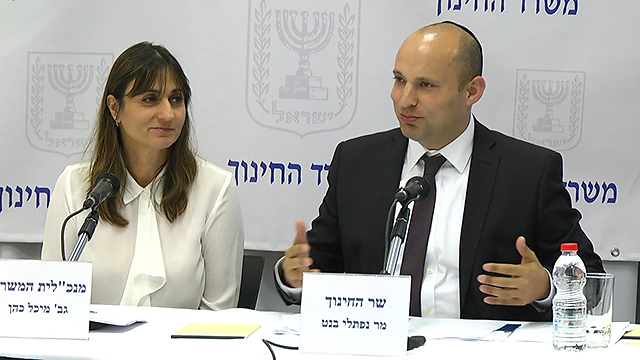Budget increase to fund 6,000 cultural performances for 8,000 students, with less advantaged towns getting priority; following controversy over play this year, a new external committee is to consider appropriateness of potentially inflammatory works.
More money, more performances, and more caution regarding controversial works were all part of the new “culture basket” the Education Ministry presented on Thursday.
The plan increases the budget allocated for schools to use on cultural performances by NIS 6 million to NIS 22 million a year. The number of municipalities benefitting is to rise, and students from less advantaged municipalities are to receive a higher proportional budget.
A third of the cultural performances for schools are to be drawn from a list formulated by the Repertoire Committee, while the other shows will be chosen by school principals. But given recent controversy over the issue, such as the firestorm surrounding the play “Parallel Time”, an external committee made up of cultural figures is to be formed in order to discuss controversial works and decide whether they are appropriate for schools.

Up to now, the Repertoire committee has ruled on 100 percent of performances, including theater, cinema, music, literature, visual arts, and dance. The committee formulated an annual list of acceptable works from which principals could make selections. Principals will now be able to choose two-thirds of the works, even if they are not on the approved list. This usually means at least three works a year.
To this end, the Education Ministry plans to create an online database logging all performances in Israel. Educators will be able to publish reviews of these performances and choose which performances to see or artists to bring to school, based on their fellow educators’ recommendations and in accordance with the values they seek to promote at the school. The database is supposed to go live this May, while the overall plan is to come into effect when the next school year begins in autumn.
“We are creating a balance between culture and art on the one hand, and advancing values that are important to the school principal on the other,” said Education Minister Naftali Bennett at a Thursday morning press conference. The Ministry pointed as an example to the play “Ofer and Dekel”, which deals with integrating special needs children in society, which did not make the Repertoire Committee’s list, but to which principals will now be able to take students.
New committee
Meanwhile, Education Ministry Director General Michal Cohen is to form an external committee to consider controversial works. The Education Ministry emphasized that the Repertoire Committee has a cultural mandate, while the external committee is meant to consider works from an educational perspective.
Education Minister Bennett decided, for example, not to permit the play “Parallel Time” to be part of the culture basket, while the Repertoire Committee disagreed. According to the new plan, the suitability of such a controversial work would be up to the external committee.
“This means works that have elements of pornography, violence, racism, expressions that oppose the values of the State of Israel, or preaching terrorism,” said Bennett. Asked what would prevent him from overturning the external committee’s decisions as he did the Repertoire Committee’s, he said: “I do not believe there will be personal intervention here because the committee will deal with pedagogy, which was not true in the case of the Repertoire Committee on the question of ‘Parallel Time’.”
More towns to benefit
The new basket also allocates an extra NIS 6 million, bringing its budge to NIS 22 million. The basket so far involved 1,200 cultural performances for 500,000 students, and will now have the budget to fund 6,000 shows for 800,000 students.
Furthermore, up to now only 100 municipalities were included. Municipalities like Sderot, Ariel, Netivot, and Umm al-Fahm, for example, were not included, and hence missed out on cultural subsidies.
The Education Ministry says the basket will now be able to cater to 170 local municipalities out of a total of 250. Budgeting is to be proportiona based on the municipality’s “Care Index” and its number of students, in an effort to boost access to culture for children in less advantaged locations.
“I am very excited because I have news for the students of Israel,” Bennett said. “From now on, every Israeli child will be able to see all the plays in Israel, and students from weaker towns will receive more funding than students in strong towns. Until now, only a small section of Israel’s children was exposed to a small portion of plays.”
As reported by Ynetnews
